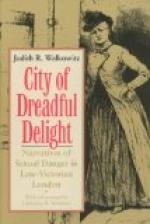They were silent lips that once knew the art and the sound of speech. The old habit never entirely fell away from them. Under this anguish they moved—fruitlessly; over the deformed face flitted the keen agony of regret; then he lifted his great left arm and bent it upward at the elbow; the huge, even monstrous muscles, knotted and kinked from shoulder to elbow, sank down under the broad barbarian bracelet of bronze and rippled under and rose again from elbow to wrist, ferocious, superhuman! In that movement the dying man read the mute’s consecration of his one great strength to the protection of the tenderly loved Laodice. Costobarus motioned to the shittim-wood casket and Momus undid it and strapped it on his own belt.
“The frosts! The frosts!” the dying man whispered. The mute understood. Then the father’s eyes wandered toward the figure of his daughter fended away from him by the pagan. The agony of her suffering and the agony of his distress for her bridged the space between them. And while they yearned toward each other in a silence that quivered with pain, the light darkened in Costobarus’ eyes.
When Laodice came to herself, she was laid upon a spot of rough grass, in the shelter of an overhanging bluff. It was not the scene upon which her sorrow-stunned eyes had closed a while before. The village was nowhere in sight; the plain had been left behind; any further view was shut off by Aquila’s horse, and the two camels whose bridles were in the hands of Hiram. Beside the stricken girl knelt Momus and Aquila; standing at her feet was a new-comer, on whom her wandering and half-conscious gaze rested.
He was an old man, clad in a short tunic, ragged of hem and girt about him with a rope. Barefoot, bareheaded and provided only with a staff and a small wallet, he was to outward appearances little more than one of the legion of mendicants that infested the poverty-stricken land of Judea. But his large eyes, under the tangle of wind-blown white hair and white shelving brows, were infinitely intelligent and refined. Now, they beamed with pity and concern on the bereaved girl.
But she forgot him the next instant, for returning consciousness brought back like a blow the memory of the death of her father.
From time to time she caught snatches of conversation between the old wayfarer and Aquila. They were spoken in low tones and only from time to time did they reach her.
“He was Costobarus, principal merchant of this coast,” she heard Aquila explain shortly.
“I shall go on to Ascalon; I do not fear,” the old man said next. “I shall bring his people to fetch his body. I marked the spot. Comfort her with that, when she can bear to talk of it.”
“We go to Jerusalem,” Aquila went on, some time later, “else we should turn back with him ourselves. But we dare not risk the pestilence on her account, for it seems that she is very necessary to the Jews at this hour—very necessary.”




